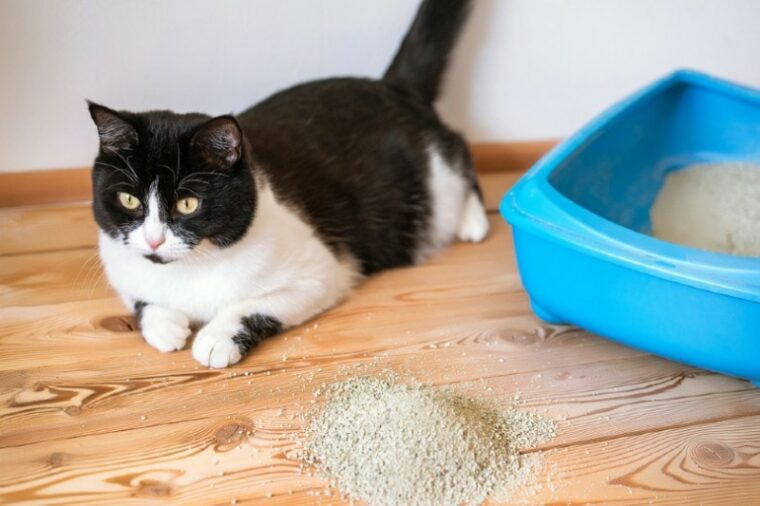
Cats have some strange habits. You have probably noticed your feline smelling or eating its own poop, which is not unusual for cats. This condition is known as coprophagia, and it’s widespread in cats and dogs. As a feline owner, you probably wonder why this happens, how to help your feline, and stop them from engaging in this activity.
Cats eating their own feces can happen simply due to curiosity, while it can also indicate some serious health issues. You should know how to recognize the cause behind poop eating and decipher why your cat does it.
We will discuss this topic more throughout the article and provide more information about this behavior, so keep reading to learn more.
Is It Normal for Cats to Eat Their Poop?
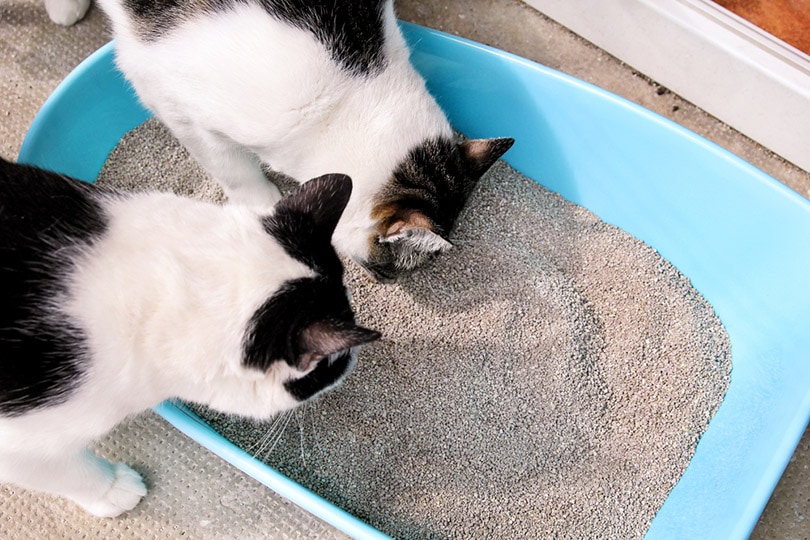
When it comes to cats, eating their poop is quite normal and helpful in certain stages of life. Young kittens may develop this habit when they notice their mom licking and grooming, or it can happen as an instinct to ensure proper gastrointestinal tract development. Mother cats may eat their feces to prevent the kittens from eating it, as they can sometimes contain parasites. Most felines grow out of this habit, especially if they’re potty trained, but some cats continue doing this even in adulthood.
Also, as cats love to be clean and groom themselves often, and if your feline has accidentally defecated on itself, it will simply lick the area to be cleaner. Although this habit is disgusting to most humans, it doesn’t necessarily need to be bad for your feline’s health—but it also depends on the reason behind the pattern.
The Reason Behind This Strange Habit
There can be multiple reasons behind why your cat is eating its poop. They can be both medical and behavioral, so you should look for clues that will help you figure out what’s going on.
Medical Reasons
First, we will mention all the medical reasons that can cause your cat to eat its poop. Below you can find the most common medical causes of this habit.
Behavioral Reasons
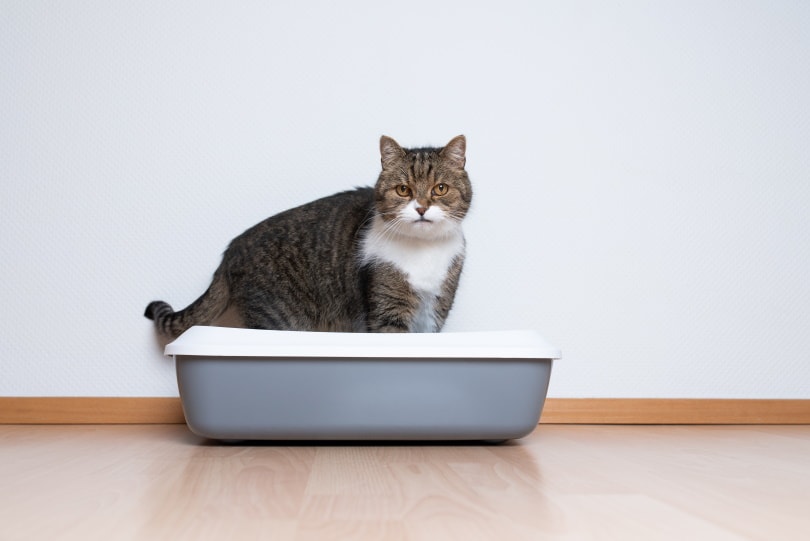
Behavioral reasons can also be a cause for coprophagia. Cats may have a behavioral urge called pica, making them eat inedible materials, including poop. If your cat has pica, its body will think that the cat is hungry, although it’s not. Felines also tend to eat their feces if they are prone to stress and anxiety. This weird habit can also be a sign of boredom or lack of playtime. Some cats may even eat their poop if they’ve used the wrong spot as their bathroom to avoid possible punishment from their owners.
Even if you keep a clean and tidy litterbox, you probably still find yourself with cat odors and stains around the house – but with the Hepper Advanced Bio-Enzyme Pet Stain & Odor Eliminator Spray, you can permanently remove even the very worst pet stains and smells! Click here to learn more and get yourself a bottle.
- ADVANCED ENZYMATIC CLEANER - Penetrates the most stubborn smells and stains at the deepest molecular...
- FOR ANY MESS, ON ANY SURFACE - This pet odor eliminator cleans your carpets, floors, furniture,...
- FRESH, NATURAL ODOR - Our unique formulation doesn't rely on dangerous or unpleasant chemical...
At Pet Keen, we’ve admired Hepper for many years, and decided to take a controlling ownership interest so that we could benefit from the outstanding products of this cool cat company!
How to Make a Diagnosis
If you notice this issue, it’s best to schedule a vet checkup. Your veterinarian will be able to determine if the feces eating pattern has a medical or a behavioral cause. They will likely do complete blood tests and a urinalysis to ensure everything is okay in your feline’s organism. If the reason for poop eating in your cat is not medical, your vet will need to know everything about your feline’s eating habits, history, and environment.
Do not play doctor, and do not deny the problem because it can lead to severe consequences.
Does Eating Poop Cause Sickness to Felines?
Although coprophagia is not a severe medical condition and is not unusual for cats, your cat can still suffer from problems if it develops this habit. When ingesting poop, cats can likely catch diseases like Salmonella or Escherichia coli, as well as parasites. Also, your cat might have tummy issues due to eating the feces. Those diseases could also harm you, so be cautious.
If you notice your cat doing this, do not allow it to lick you, and ensure you wash your hands regularly until you resolve the problem with your feline.
The 5 Ways to Prevent Your Cat From Eating Its Poop
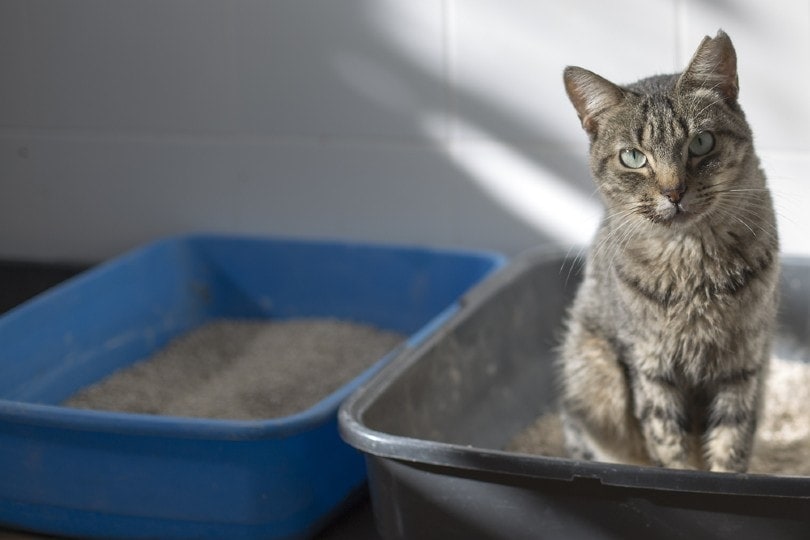
Poop eating in cats is a habit that’s difficult to break, so be prepared and patient with your feline. There are a couple of things you can do to prevent your cat from eating its poop, so check them out below.
1. Clean Up After Your Cat
The best way to prevent your cat from eating its feces is to pick it up or dispose of it when you notice your feline pooping. Constant cleaning after your cat defecates might be daunting since you’ll need to be extra careful, but it will help with the issue. You could even buy an automatic litter box that immediately scoops off feces once your cat goes. If you’re taking your feline outside, it might be useful to have a leash or a harness so that you can pull it away if it tries to eat feces.
2. Slow Down Your Cats’ Eating
When cats eat too fast, they don’t digest the food properly, which can lead to your cat eating feces. It would be helpful to slow down your cats’ eating so that it can digest the food better and improve the consistency of its feces. It would be good to create a feeding routine for your feline and predict when it will need to go potty. That way, you can monitor its behavior and know when you need to clean the litter box.
3. Increase the Activity Level
Since cats can sometimes eat their poop as a sign of boredom or anxiety, you could increase the activity level of your kitty. Provide opportunities to explore, play and be adventurous. Try to engage your cat in family activities and give it the needed love and care. Exciting activities will make your kitty less stressed and bored, which will take their minds off of eating poop.
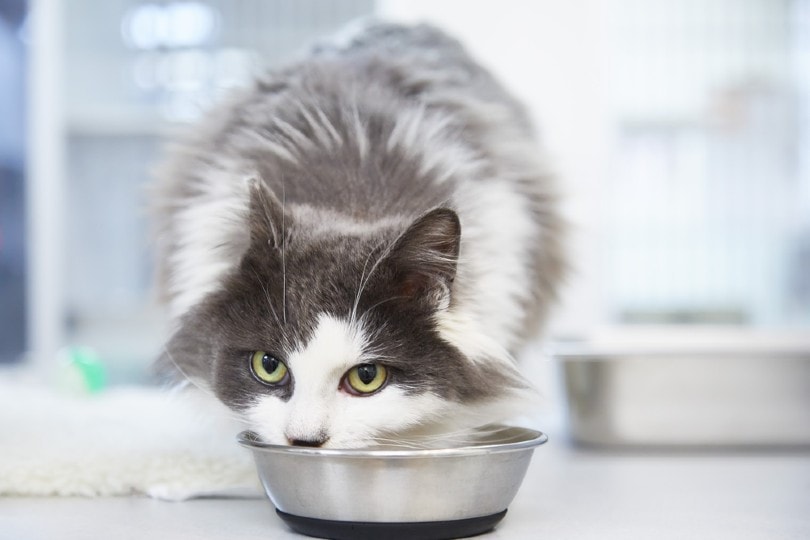
4. Diet Change
Since poor diet and food quality can also lead to coprophagia, it would be helpful to make a diet change for your feline. Provide a diet that’s higher in protein and fiber, and ensure you give your cat enough meat products. Before deciding on this preventive step, consult your vet to verify which foods you should include in your cat’s diet.
5. Be There for Your Cat
If you notice that your cat is eating its poop, do not punish or scold it. Such a reaction from your side can make your feline even more anxious or scared, so it might continue to eat feces to avoid punishment. Consider giving potty training one more go, and ensure you reward your cat when it doesn’t eat poop in the situations it previously did. Your positive attitude towards the problem will help your cat and encourage it to stop this habit.

Conclusion
As we already said, this habit can be hard to break, but you shouldn’t be discouraged. Try to notice the problem early and be there for your feline through the process of stopping the pattern. Always consult your vet to ensure that the issue is not medical, and in case it is, you should provide the required treatment and medication for your feline.
Remember that your cat needs someone to rely on when times are tough, as this situation can be complicated. Your kitty will appreciate you taking all the required steps to help them fight this habit and develop a healthy diet.
Featured Image Credit: Tanya Plotnikova, Shutterstock






